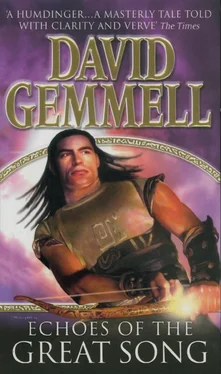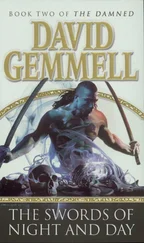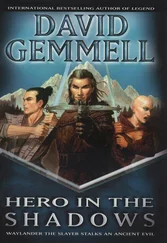During the past seventy years Viruk had known enormous joy. He felt bonded to Questor Anu, for they were both committed to the work of the Supreme Being.
Viruk felt at peace as he rode from the village of Pacepta. Ignoring the villagers who bowed low as he passed, he cantered the horse through the gates and headed north-east, towards the border of the Mud People. He hoped to discover more raiders, to deliver more souls into the flaming maw of the Source.
He knew no fear as he rode. He felt immortal. Invincible.
It is good to be holy, he thought.
Sofarita had come to believe herself a good judge of human nature. She had observed the curious posturing of the village men during courtships, and the occasional violent displays that followed heavy drinking in the village hall. She had witnessed outpourings of grief, and moments of great joy. She thought she understood how men's minds worked.
Now she knew differently.
She had run from the house to where her father and mother were waiting in the small home of her Aunt Kiaru. The whole family were sitting in the main dining area as she entered. Kiaru, as always, was beside the hearth, making yet another rug. Her husband, a short, slender man, round-shouldered and worn out by years of work, was standing by the window, leaning on the ledge. Bekar and her mother were sitting at the table. Three small children were playing on the floor.
'He healed me!' said Sofarita, happily. 'He said I had a cancer and would die, and he held a crystal to my breast and he healed me. I am going to live.' The sheer joy of knowing she would live radiated from her, and in the blindness of its glow she failed to see the stiffness leach into the faces of her family.
No-one spoke for a moment. Then Bekar glanced up. 'You should be in your home,' he said coldly. 'Not running through the village trumpeting your shame.'
Sofarita stood very still. 'Shame?' she enquired. 'What shame? I did what you told me.'
'A decent woman would have crept away to hide,' he said, not looking at her. 'Not… not danced through the streets like a whore!'
A sense of unreality settled on her, as if she was walking through a dream. She could make no sense of the reaction. Instinctively she ran his words through her mind, seeking understanding. Then she realized. He had called her a whore. A cold anger settled on Sofarita. Bekar had always been a hard man, but until now he had been a fair one. 'A whore, am I?' she said, her voice trembling. 'You come to my home. You beg me to rut with him. You plead about the safety of the village. And when I reluctantly agree, and do this vile thing, you call me a whore? Well, what does that make you, father? The whoremaster. The pimp! The procurer!'
With a savage roar he surged to his feet. Sofarita stood her ground and his fist cracked into her cheekbone, hurling her back into the wall. She hit hard, and struggled to regain her balance. But dizziness swamped her and she slid to the floor, unconscious.
When she opened her eyes the men had gone. She was lying on Aunt Kiaru's bed. Her head throbbed with pain. 'There, there, child,' said Kiaru, her fat face, normally so jolly, looking drawn and worried. She was dabbing Sofarita's face with a wet cloth. 'There, there!' she cooed.
Sofarita groaned as she sat up. Instantly her mother rose from a nearby chair and moved to her side. 'How are you feeling, Tia?' she asked. 'Is there much pain?'
Sofarita shook her head. Who could describe the pain she was feeling inside? Bekar was a cold man sometimes, but he had never before struck her, or any of his children. Swinging her legs over the side of the bed Sofarita tried to stand. Giddiness made her stumble, and she sat down swiftly.
'It'll pass,' said Kiaru soothingly. 'All this anger will pass and then your father will forgive you.'
'He will forgive me?' said Sofarita, the tone hard-edged. Kiaru did not seem to notice.
'Of course he will, dear, of course he will. Everything will be all right.'
Sofarita turned to her mother. 'He made me do it,' she said. 'How could he insult me so?'
'You weren't expected to enjoy it, Tia. That's what hurt him.'
Sofarita looked into her mother's careworn face, seeking some secret sign that would say: I don't mean it the way it sounded, but I have to say it. There was none.
Sofarita struggled to her feet once more. The giddiness had passed and she moved slowly to the bedside chest, upon which was a small oval mirror. Lifting it she looked at her face. Her right eye was bruised and swollen shut and her cheek showed two purple bruises where Bekar's knuckles had struck her. Replacing the mirror she walked into the main room and then out onto the street, crossing it swiftly to the small home she had made with Veris.
From a chest at the back of the bedroom she took her savings. Twenty-six silver pieces in a canvas pouch.
She hung it around her neck, hiding it in the folds of her white dress. From a cupboard she took a small shoulder sack and stuffed her second dress into it. Veris had owned a black pony and it was stabled behind the house.
Sofarita filled a sack with what food she had to hand: a fresh-baked loaf, a chunk of honey-roasted ham and a wedge of cheese wrapped in muslin. Then she walked to the stable and saddled the pony. It took her some time to ease the bridle bit into place, but at last she managed it.
It was a 30-mile ride to the city of Egaru. She would not make it before dark.
Moving back to the kitchen she found Veris' hunting knife, a long curved blade set in a hilt of deer horn.
Belting the sheath at her waist she threw a black hooded cloak around her shoulders and returned to the pony Veris had taught her to ride and she mounted smoothly.
Then she rode along the side of the house and out into the main street, heading for the gate.
Bekar came running from his new house, shouting for her to wait. Sofarita swung the pony.
'Where do you think you are going?' he thundered. A crowd began to gather.
'I am going where no decent woman is ever forced to rut with strangers,' she said, her voice loud, almost strident. 'I am going to a place where fathers do not give their daughters to every swordsman who happens by.'
His fat face reddened. 'Get off that pony now,' he ordered her, 'or I will drag you from it.'
Without haste she drew the hunting knife from its sheath. 'Come near me again and I will kill you,' she told him. He stood, blinking in the fading light, the eyes of the villagers upon him. She felt no pity for him.
He stood very still, his huge arms falling to his side. All the strength seemed to flow from him. 'I am sorry, Tia,' he said at last, his voice breaking.
'So am I,' she told him.
'Stay with us. I will make it up to you. We will be friends again.'
'We will never be friends,' she said coldly. 'For I never intend to see you again.'
With that she rode the pony out through the gate, heading west towards the setting sun.
Viruk followed the line of the Luan River for several hours, hoping for sign of more raiders. But there was none, and he was growing bored. Across the wide river he could see Mud People settlements, huts of mud-caked wattle, and poorly constructed paddocks. The tribes bred like lice and if Viruk had his way he would bring an army down on them, wiping them from the face of the earth.
There were just too many people now in this land and a cull was needed.
The Questors spoke of the migration of the tribes, caused by the ice and floods that now covered more than half the planet. To survive, the northern tribes moved south to this fertile land, while the tribes far to the south were pushing north.
Soon there would not be enough corn to feed them all.
Viruk's pony was tiring as dusk approached and he stumbled as Viruk forced him up the last hill before the old stone bridge. The river narrowed here. Viruk dismounted and gazed down at the crossing. This had been his last hope of making a good kill. But there were no soldiers to be seen.
Читать дальше












